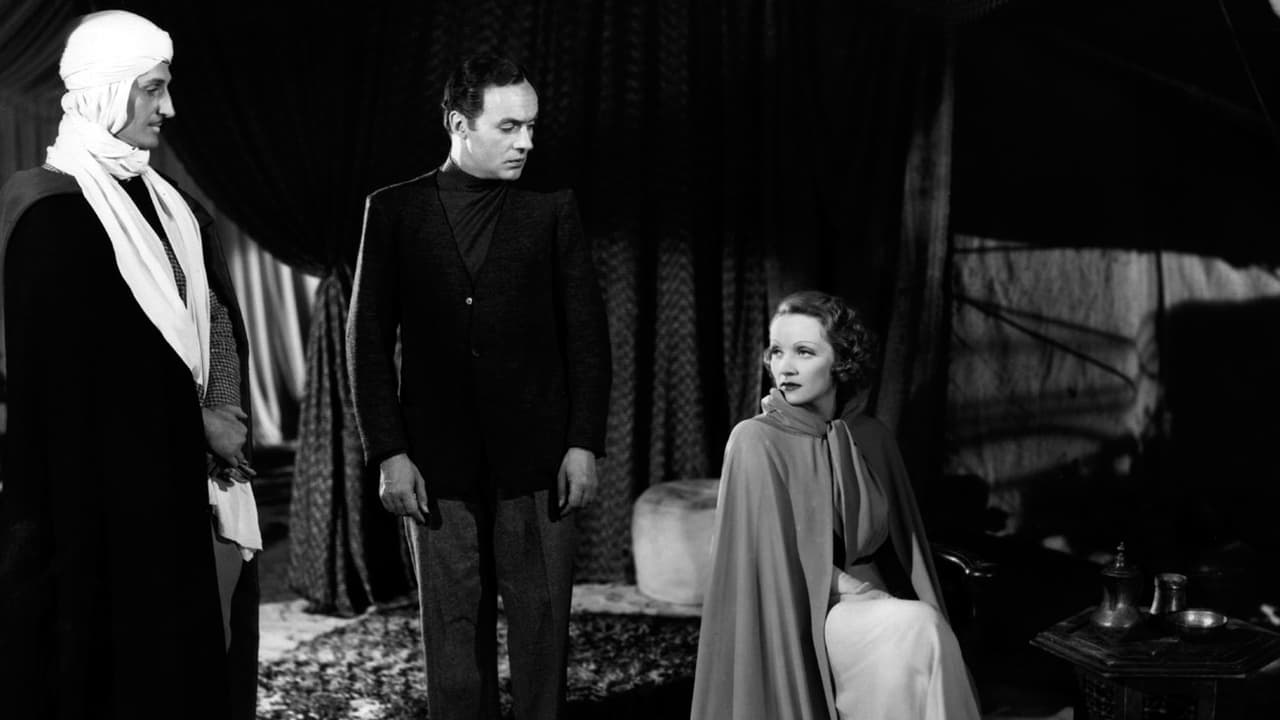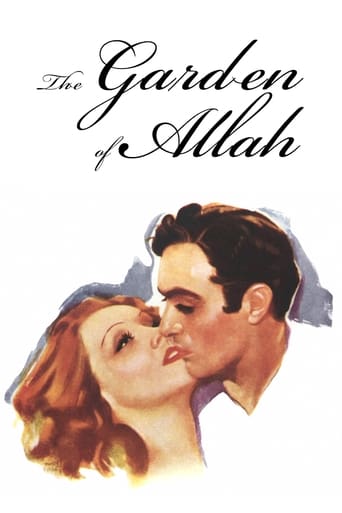

I had read up on this movie before watching it. A lot of people said it was boring and I have to agree with them. I really enjoyed the colouring and even the title of the film. Really I should be giving this film a 3/10. But I'm going to do that. I watched this movie only because Boyer and Dietrich were in it. I'd give this movie a 10/10 solely for Charles Boyer's face because it was a masterpiece in this film. We've always been used to the black and white Boyer but this film truly brings out the fullness of his face. The tortured, painful and sometimes almost pouty made his face even better. So literally watch it for its historical significance and Boyers gorgeous face. Oh yeah, and Marlene was beautiful, as always.
... View MoreThis film, based on an old novel and several silent treatments is dramatically pretty good, with Charles Boyer and Marlene Dietrich meeting and romancing in the desert. Tilly Losch's exotic dance is but one visual highlight in what has to be one of the most gorgeous pictures of the 1930s. The Technicolor photography at this early date is beautiful to behold and the print on the DVD has been astonishingly well preserved. What a revelation this must have been to audiences in 1936. As one of the first three-color Technicolor features, the contrast between this and the old two-color systems gives a vivid life-likeness to experiencing this film. A must for students of early color.
... View MoreDespite ravishing color photography and a sterling cast, David O. Selznick's production of "The Garden of Allah" is badly dated. A Trappist monk abandons his vows and leaves the monastery with the recipe for a unique liquor, only to fall for a convent-bred beauty with deep religious convictions who is seeking the meaning of life in the desert. When monasteries attract the likes of young Charles Boyer and convents produce women with porcelain complexions like Marlene Dietrich, religion may experience renewed popularity.Set in North Africa as conceived by Selznick's fanciful art directors, Dietrich shimmers in flowing gowns and floats through a postcard-perfect desert. Her elegant silhouette is outlined against deep crimson sunsets that presage the indelible image of Scarlett O'Hara in "Gone with the Wind." If the preposterous story were half as captivating as the visuals, the film would be riveting. Unfortunately, modern viewers may giggle at the melodrama and hokey motivations. Both Dietrich and Boyer have done better and seem to be in a trance throughout. Staring fixedly into space stands in for spiritual conflict, and only the dependable Basil Rathbone cuts through the nonsense. Although the film runs less than 80 minutes, it seems at times to be tedious and interminable. Perhaps Dietrich's best director, Josef von Sternberg, could have conjured a classic from this cast and crew, but Richard Boleslawski's resume is thin and undistinguished. Possibly Boleslawski fell in love with his stars, because the camera lingers on the perfectly lit faces of both Boyer and Dietrich. Maybe the director knew that the plot and dialog were weak and hoped that the lush photography and the charisma of his leads would carry the film.Despite the visual feast, "The Garden of Allah" will appeal to few beyond die-hard Dietrich and Boyer fans. Others may squirm, smirk, and make smart asides to the screen. If "Mystery Science Theater 3000" broke beyond the science-fiction genre, Tom Servo and the bots could really work this one over.
... View MoreFirst, I rented this film because of Charles Boyer, who mesmerized me on the Late Night Movies when I was a young babysitter. His hypnotic gazes of pain, adoration, some inner darkness, a glowing kindness--wow! I rented this film in spite of Marlena Deitrich, who has the misfortune of 1936 eyebrows and script lines and type. Cast against type here, no matter. John Carradine I didn't even recognize--had to go back to find the actor in the brilliant characterization of the Sand Reader. So. In my life right now I have a dog I love a lot, a big blonde dog who is 13 years old. I'm in a Zen Buddhist residence where no dogs are allowed. Mack the dog has been with my daughter in her small apt. which is also her art studio. Now she needs her time and space. Do I leave my religious residence to live with Mack in civilian housing? Or do I give up the dog I love to remain in the temple? I am Charles Boyer in this case, and Mack is Domini, the character played by Dietrich. I am working on the revised script.
... View More